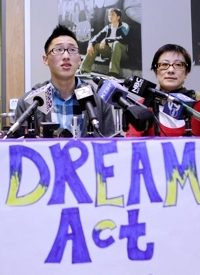
Passage of the DREAM Act is a top priority for Senate Majority Leader Harry Reid, and with two new versions of the DREAM Act up for debate, Reid’s “DREAM” may become a reality. According to The John Birch Society:
The White House, unaccountable agency czars, and Congressmen, some of whom compromised integrity for votes in the pre-mid-term election cycle, are creating confusion over the details with the political goal of passing it without much objection. Congressmen who never read bills, won’t know which version they are voting on.
Furthermore, the difference between the two versions of the bill is so minor, as one maintains an eligibility age of younger than 35 for the program while the other simply lowers the age to 30, passage of either one ultimately would have the same impact.
Senate Bill 3963, known as the DREAM Act, is touted as legislation that would provide amnesty to hard-working illegal aliens who enroll in college or enlist in the military. A summary of the bill says it
Authorizes the Secretary of Homeland Security (DHS) to cancel the removal of, and adjust to conditional permanent resident status, an alien who: (1) entered the United States before his or her 16th birthday and has been present in the United States for at least five years immediately preceding this Act’s enactment; (2) is a person of good moral character; (3) is not inadmissible or deportable under specified grounds of the Immigration and Nationality Act; (4) has been admitted to an institution of higher education (IHE) or has earned a high school or equivalent diploma; (5) from the age of 16 and older, has never been under a final order of exclusion, deportation, or removal; and (6) was under age 30 on the date of this Act’s enactment. Requires aliens to apply for such adjustment of status within one year of being admitted to an IHE or earning a high school or equivalent diploma. Sets forth conditions for maintaining such status and having its conditional basis removed. Authorizes: (1) the Secretary to adjust the status of an alien who has met such conditions prior to enactment of this Act to conditional permanent resident status; and (2) such alien to petition the Secretary for permanent resident status at the end of the conditional residence period. Provides for: (1) exclusive jurisdiction; (2) penalties for false application statements; (3) confidentiality; (4) higher education assistance; and (5) a Government Accountability Office (GAO) report respecting the number of aliens adjusted under this Act.
However, in a revealing exposé entitled “Ten Things You Need to Know about S. 3827, the DREAM Act,” Republican Senator Jeff Sessions of Alabama explained that the DREAM Act is merely a backdoor way to provide amnesty for all. According to Sessions, under the act, illegal aliens who are given citizenship status for enrolling in college are not required to complete any degree for which they are enrolled. However, the illegal aliens would be entitled to in-state tuition benefits, as well as federal student loans, federal work-study programs, and other forms of federal financial aid, to the chagrin of American students who struggle to receive similar benefits. Despite what has been asserted by Senator Reid, Senator Sessions contends that the DREAM Act does not require military enlistment as a condition for amnesty, but that there is a legal process in place to that will allow military enrollment as a means to obtain U.S. citizenship. Sessions also indicates that under the DREAM Act, those illegals who acquire citizenship status will be provided all the rights that legal immigrants receive, including the right to sponsor their parents and extended family.
Moreover, the DHS is prohibited from using the information obtained on the DREAM Act Amnesty applications to deport illegal aliens whose applications have been denied.
In addition to Democratic support, the DREAM Act is also supported by Republicans Richard Lugar from Indiana and Robert Bennett of Utah. Others are considering adding their support as well, including Orrin Hatch, who helped write the original legislation nine years ago, Olympia Snowe, Lisa Murkowski, John McCain, Susan Collins, and Sam Brownback.
The John Birch Society website is encouraging those who take issue with the legislation to contact their elected officials to voice their concerns and demand a vote against the Act.
The website asserts:
As more and more Americans become unemployed and diligently job hunt to make their lives better, it doesn’t make sense to grant amnesty to an additional 2 million more who will likely compete with Americans for the precious few jobs.
Those who break the law should not be granted amnesty. Do not bow down to the pressure of special interest groups and high-paid lobbyists.
What kind of elected representative would favor law-breakers over honest American citizens?
Both versions of the DREAM Act currently appear on the Senate calendar.
Rotator and above graphics: Steve Li, 20, center, speaks during a news conference as he sits next to his attorney Sin Yen Ling, left, and mother, Mary Li, right, at his attorney’s office in San Francisco, Nov, 23, 2010: AP Images




